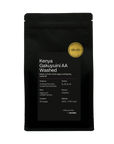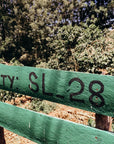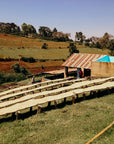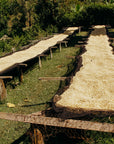Unassuming Clarity, Unique Complexity 🇰🇪
A Classic Washed Kenya from Gakuyuini
Some coffee moments remain etched in our sensory memories for the satisfyingly surprising imprints they made on our palates — like our first encounters with washed coffees from Kenya.
For many of us, specialty coffee lovers, it was our first taste of a complex flavor profile that was all at once clean and fragrant, juicy and sweet, and also fascinatingly fuller-bodied. Over countless cups, we recognized this as the classic character of a good Kenyan coffee.
So now, we couldn’t be more thrilled to be refreshing our collection of Kenya micro-lots with the return of a classic, best for brewing nostalgic pour-overs— Gakuyuini AA Washed from the Thirikwa Cooperative Society.
Gakuyuini AA will either be a trip down sensory memory lane if you’re a long-time specialty lover, or a ticket to time travel back to the earlier days of our specialty coffee discovery, if you’re fairly new in your journey.
Either way, get yours here now, or when you visit us at our roastery in Sharjah soon.




Kenya - Gakuyuini AA
Producer: Thirikwa Farmers Cooperative Society
Farm: Gakuyuini Coffee Factory
Location: Kirinyaga County
Variety: SL28, SL34
Process: Washed
Altitude: 1,600 - 1,700 masl
| Fermentation | ▪▫▫▫▫ |
| Sweetness | ▪▪▪▪▫ |
| Acidity | ▪▪▪▪▫ |
| Roast | ▪▪▫▫▫ |
Brewing Guide
- Ready your brewing tools ahead.
- Keep your coffee gear and containers clean.
- Decide and adjust your grind size based on:
— Your coffee’s roast date
— Your brewing method
- Be consistent with water quality and measuring weight, ratios, and time.
- Remember!
— Let your palate help you personalize the best recipe for you.
— Brew often and have fun!
More about Brewing here.




